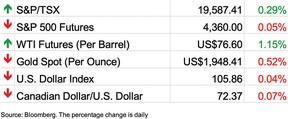Posthaste: Borrowers feeling the strain as Bank of Canada says higher rates may be here to stay

More than a third of Canadian homeowners worried about paying their mortgage

Article content

Article content
Be prepared, the Bank of Canada said this week — the era of low interest rates may be over.
Since the great financial crisis of 2008, interest rates in Canada have not risen above 1.75 per cent and during the pandemic they sunk as low as 0.25 per cent.
“It can be tempting to think those very low rates will eventually return. But there are reasons to think that may not happen,” said the Bank of Canada’s senior deputy governor Carolyn Rogers in a speech in Vancouver Thursday.
Advertisement 2
Story continues below
Article content
Global forces that kept rates low may have peaked and could start reversing, she said. Wars in Ukraine and the Middle East could escalate and push up energy prices and reignite inflation.
The Bank through its own surveys knows that Canadians are feeling the pressures of higher borrowing costs and inflation, she said. With most homeowners still to renew their mortgages at higher rates, policy makers are watching how they adjust.
“By the end of 2026, virtually all remaining mortgage holders will go through a renewal cycle and, depending on the path for interest rates, may face significantly higher payments,” she said.
Already more than a third of homeowners are concerned about paying their mortgage over the next three years, according to a recent survey commissioned by rates comparison site Ratesdotca. More than half of these are younger than 55.
“Someone who bought a home on a variable-rate mortgage, for instance, is now seeing their mortgage payments double or triple,” Jacqueline Porter, an Ontario-based financial planner told Ratesdotcom.
“Interest rates were moving at a breakneck speed and Canadians weren’t prepared for it. Particularly, as they were coming out of zero interest rate scenarios.”
Article content
Advertisement 3
Story continues below
Article content
Higher mortgage payments mean less money for other bills. Just over 10 per cent of homeowners polled said they are unable to cover monthly expenses and are either drawing on their savings or using credit to do it.
Again, those who are younger than 55 were twice as likely to have to resort to credit or savings to make ends meet.
Half of homeowners also said they can afford only $500 or less in extra monthly costs such as unexpected home or car repairs.
The strain on Canadians’ finances will only increase if the economy takes a turn for the worse.
Evidence is building that Canada is in the early stages of a “mild” contraction, Royal Bank of Canada economist Claire Fan said in a recent report.
Household debt servicing costs are at record highs and if the economy worsens some people could lose their jobs.
“With more impact of interest rate increases still to be delivered, Canadian households are starting to look more vulnerable to income losses at a time when labour markets already look wobbly,” she said.
_____________________________________________________________________
Advertisement 4
Story continues below
Article content
Was this newsletter forwarded to you? Sign up here to get it delivered to your inbox.
_____________________________________________________________________


Rates traders are betting that the steepest global tightening cycle in a generation is over and that monetary easing will begin from mid-2024.
Swaps signal the average cash rate for developed economies will be steady over the coming six months, the first time in two years that they’re not pricing in a hike over that time frame, according to data compiled by Bloomberg. They also show a 50-basis point reduction in the aggregated rate within a year, the biggest bet on easing since the pandemic.
From Europe to the U.S. and Australia, bonds have bounced back this month as traders speculate that central banks may soon call a halt to monetary tightening as price pressures recede. It’s a risky bet as previous wagers to that effect backfired after inflation proved to be stickier than anticipated and expectations of a recession failed to materialize. — Bloomberg
- U.S. bond market closed to observe Veterans Day on Nov. 11
- Bank of Canada releases its Senior Loan Officer Survey
- Earnings: Onex Corporation, AtkinsRéalis (formerly SNC Lavalin)
Advertisement 5
Story continues below
Article content
Get all of today’s top breaking stories as they happen with the Financial Post’s live news blog, highlighting the business headlines you need to know at a glance.

_______________________________________________________
Drawing down your savings when your investments are at a low ebb is mentally tough to do, but no one can time the market, so portfolio manager John De Goey advises one reader to start by reducing her lifestyle and spending expectations, at least until the market rebounds and her portfolio looks healthier. Get the answer from FP Investing
Related Stories
____________________________________________________
Today’s Posthaste was written by Pamela Heaven, @pamheaven, with additional reporting from The Canadian Press, Thomson Reuters and Bloomberg.
Have a story idea, pitch, embargoed report, or a suggestion for this newsletter? Email us at [email protected], or hit reply to send us a note.
Bookmark our website and support our journalism: Don’t miss the business news you need to know — add financialpost.com to your bookmarks and sign up for our newsletters here.
Article content












Comments
Postmedia is committed to maintaining a lively but civil forum for discussion and encourage all readers to share their views on our articles. Comments may take up to an hour for moderation before appearing on the site. We ask you to keep your comments relevant and respectful. We have enabled email notifications—you will now receive an email if you receive a reply to your comment, there is an update to a comment thread you follow or if a user you follow comments. Visit our Community Guidelines for more information and details on how to adjust your email settings.